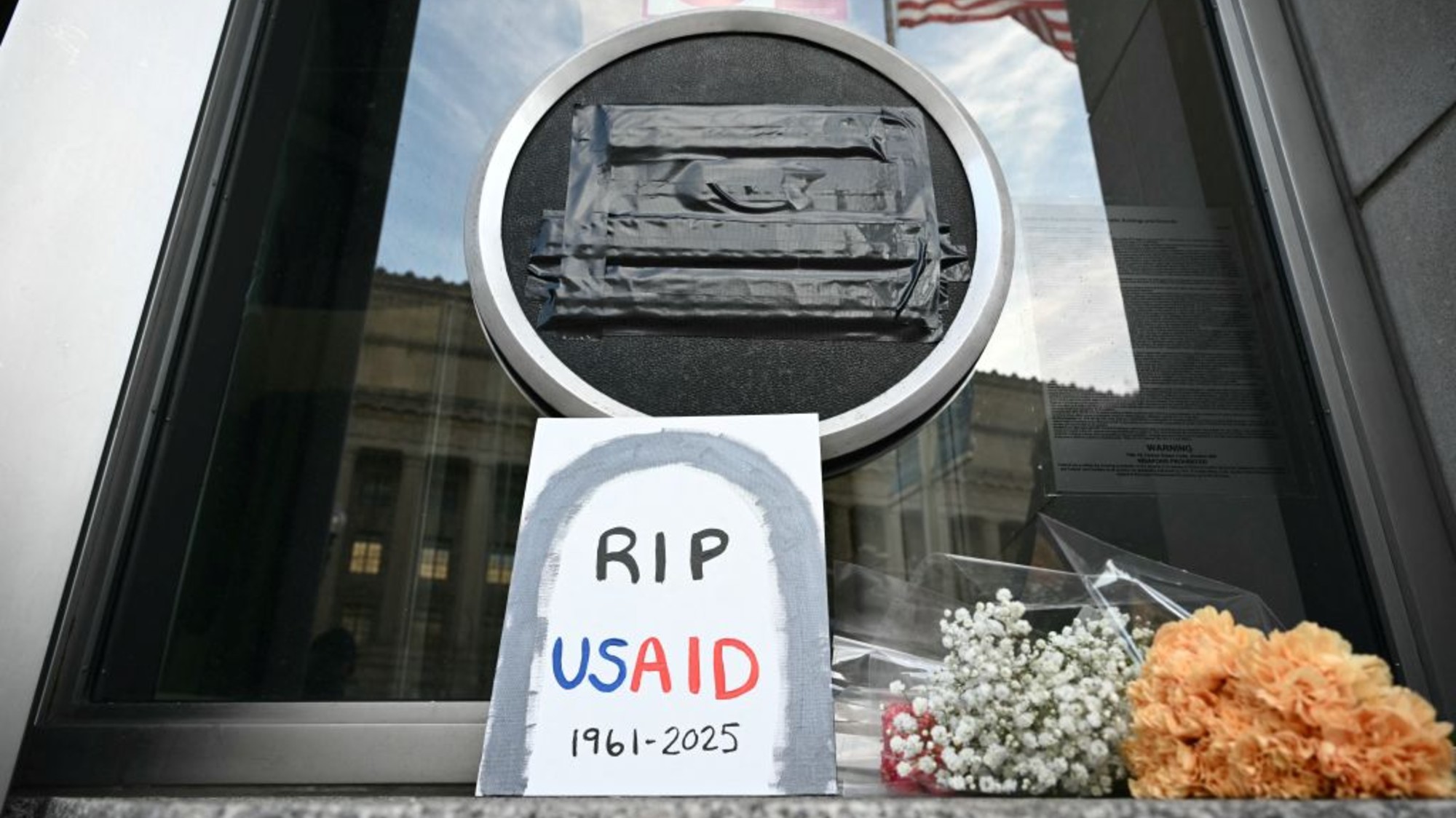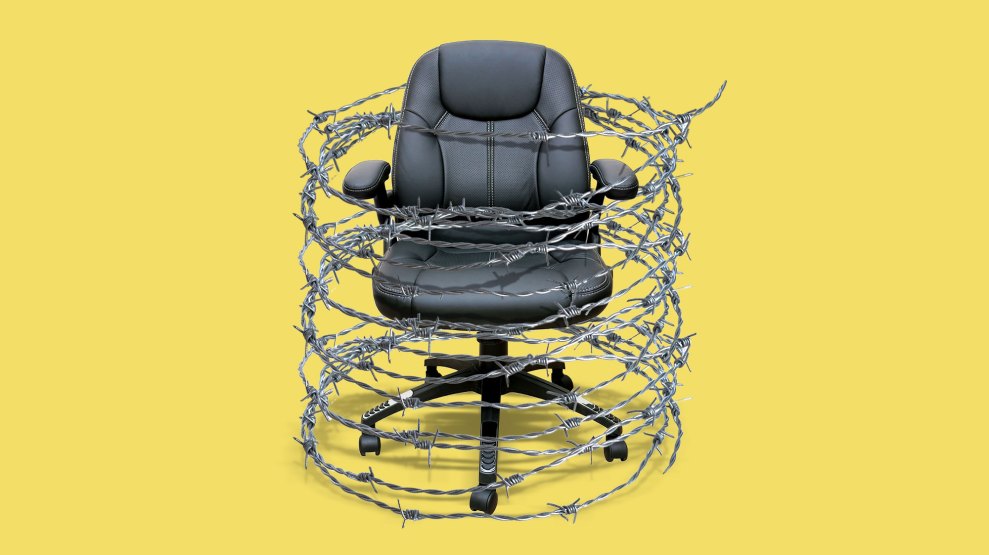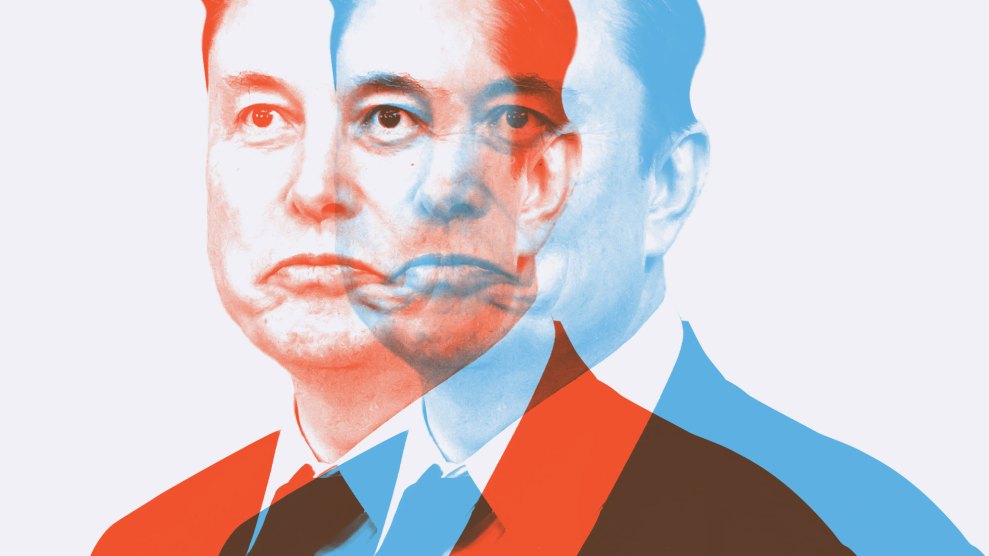Early in the morning of January 29, a few dozen US government employees and their families, clutching pets, small children, and whatever they could fit in a carry-on, left their homes in Kinshasa, the capital of the Democratic Republic of the Congo, and began an exhausting evacuation—by van, boat, and two planes—back to the United States.
Staffers at the mission had spent the first week of the Trump administration grappling with a series of confusing and debilitating new directives from Washington. They struggled to get answers to basic questions, like how to wind down programs they had been ordered to stop, and what kinds of work, if any, they were allowed to pay for. But the USAID workers in Kinshasa now had more pressing issues. The previous afternoon, demonstrators had attacked embassies in the city, and overrun the home of a USAID employee. Staff had been given an hour to pack their things.
When they landed at Dulles International Airport 48 hours later, State Department and USAID employees did their best to make the arrivals feel welcome. People were on hand with food, clean clothes, and balloons. But while the evacuees spent the weekend recovering at a Marriott near the airport, the message from the highest levels of the government was far less inviting. Staffers who had left almost all of their possessions behind and were scrambling to find housing and schools for their kids followed the news in horror, as Elon Musk bragged about “feeding USAID into the wood chipper” and called the agency’s civil servants “radical-left Marxists who hate America.”
“We’ve given up everything to serve our country overseas,” one evacuated USAID employee recalled thinking, “and we’re being maligned by the richest asshole in the world.”
Musk’s attacks have been working. While Secretary of State Marco Rubio has offered a softer tone in discussing the agency he now oversees, vowing to save, not destroy, foreign aid, nearly a dozen employees and contractors at USAID—who spoke on condition of anonymity, given the hostility they now face—told Mother Jones that directives from the new administration have already inflicted short- and long-term damage to the government’s ability to administer aid work and development programs. Musk’s threats and conspiracy theories have undermined their mission, while the demands of the Trump-ordered spending freeze have interrupted life-saving projects and shattered the foundations of the entire humanitarian aid industry. Above all, their experiences—working in what they describe as a culture of fear and mass confusion—reflect a world in which the complaints about waste and inefficiency have become self-fulfilling. DOGE was sold as a plan to fix bureaucracy. The story of USAID offers a glimpse of how to break one.
Career employees at USAID are used to dealing with new administrations and adjusting to their priorities. But they were caught off guard by the ferocity with which Trump and Musk moved to undo their work. On his first day in office, the president ordered a 90-day administrative review of all foreign-aid programs, followed not long after by internal instructions to stop work on ongoing projects. Then came DOGE.
While his team gained access to the agency’s books, Musk spent days spreading conspiracy theories about its work. He charged that the USAID was secretly underwriting Politico. He falsely accused the agency of starting the Covid-19 pandemic. In some cases, staffers noted, the White House has even blamed USAID for programs that were instead run by the State Department.
“I don’t have the adequate words,” a veteran USAID official wrote to their team. “Please just know that your work was good, and it mattered.”
The blitzkrieg, magnified by Musk’s own social media platform, blindsided people in development circles. “We always joke that you come armed to an interagency knife fight with a spreadsheet,” said a former USAID employee who worked, until recently, as an agency contractor. “We’re like, ‘but the data say,’ and ‘the evidence shows.’”
Musk, on the other hand, was lobbing accusations at their work while stripping them of the tools to defend themselves. Much of the agency’s senior leadership had been put on leave early on—ostensibly for “insubordination.” The USAID website has been down for nearly two weeks. Many employees couldn’t even respond to their emails. “We can’t even fact-check,” complained one foreign service officer, who has worked in missions in multiple African countries.
In fact, the administration’s gut renovation has hampered the agency’s ability to prevent actual malfeasance. On Monday, USAID Inspector General Paul Martin released a report indicating, among other things, that reductions in available staff had left the agency “susceptible to inadvertently funding entities or salaries of individuals associated with U.S.-designated terrorist organizations.” Trump fired Martin the next day without explanation. (The State Department did not respond to a request for comment.)
Musk’s stated goal was to destroy the agency, and he came pretty close. Last week, not long after Trump announced that the agency would be absorbed into the State Department, a Trump appointee at USAID—following directions from Rubio’s office—informed staff that all but 290 members of the 14,000-person bureau, including almost all of those stationed abroad, would be placed on administrative leave.
“I don’t have the adequate words,” a veteran USAID official wrote to their team that week, in an email announcing that the agency’s entire Africa Bureau was being reduced to just 12 people across two continents.
“Please just know that your work was good, and it mattered.”
Hours before staffers were set to go on leave on Friday, a federal judge issued a temporary restraining order, blocking the purge, and restoring thousands of employees to full-time work. But the threat was emblematic of the chaos that the new administration’s efforts have unleashed.
The stereotype of bureaucracies is that it is easy to get lost in them. Indeed, the firehose of acronyms and elongated titles at USAID can sound, to the uninitiated, like a different language entirely. A long set of rules and procedures, though, is easier to make sense of than the absence of any. The reality of the Trump takeover of USAID is that it has produced the sort of mismanagement that his administration promised to roll back.

DOGE has created a corner of government in which simple things don’t work. Several employees said they had scrambled to put in reimbursement requests before they lost access to the system—but their requests could not be processed because the people whose job it was to approve them were already on administrative leave. In one African country, housing for American workers abroad is running on a generator because funds haven’t come through to pay utilities. One employee in DC told Mother Jones she was locked out of her email without ever being informed she was on leave; even HR couldn’t say for sure what was happening.
The team from Kinshasa was stuck in a particularly cruel loop. Even as the State Department advised US citizens to “safely depart while commercial options are available,” USAID employees received guidance from Washington that in order to ensure compliance with the administration’s new spending dictates, the acting administrator would need to approve a waiver to cover the costs of their evacuation, according to an affidavit filed in federal court on Tuesday; by the time the waiver was approved, “the evacuation had already begun.” Upon arrival in the US, evacuees were instructed to find temporary housing in the DC area, in order to comply with a Trump order mandating that employees work at the office—but their office was closed, and they were about to be put on leave. All the while, they have been paying out of pocket for lodging the government is supposed to foot the bill for.
Staff in other foreign postings, many with pets or small kids, were kept in suspense for days, with no guidance about whether and how they would be asked to relocate if they were placed on leave, and what they might bring. While Rubio had said, prior to the injunction, that the agency’s recall would work to accommodate overseas staffers with extenuating circumstances, the disruptions have already hit workers hard. In an affidavit filed as part of a lawsuit challenging the purge, a pregnant foreign service officer in her third trimester identified as “Beth Doe” explained that the new directives forced her to find a new hospital in a different city, and “left us searching for high schools that will admit our children.”
The threats from the new administration instilled a fear bordering on paranoia. It felt like “psychological warfare,” said one person. Employees described a never-ending campaign of harassing emails, sometimes sent in the middle of the night, asking them to quit. “It’s just like Retire! Retire! Retire! Do this!” said a USAID staffer who works on food assistance programs. “Oh you missed the ‘Fork in the Road’ email? Well, now we updated it with FAQs that don’t make sense!” When the staffer who was placed on leave without notification finally returned to work, she discovered the “Fork in the Road” emails had kept coming, even while she’d been locked out of the account.
The chaos has been just as debilitating for the work itself. At USAID, the people breaking stuff don’t seem to understand how and what they’re breaking. Take the “stop-work” orders. In aid and development work, staffers emphasize, you can’t just bring a program to an immediate halt; it has to be wound down, and in such a way that it can eventually be restarted at the end of the review period. For both legal and ethical reasons, partners have to be paid and services might have to be maintained. If you are transporting food or medication, it has to go somewhere. At the same time, a USAID employee who had been working at a mission in Africa said, staffers were given contradictory instructions to “not incur any cost whatsoever.”
“There was mass confusion about this in my office, in my bureau, across the agency, about what those guidelines and restrictions were,” another official said. “That also included things like, ‘Okay, so you’re telling us we have a stop work order, but does that mean that partners should fire all staff to help us implement these programs? Or is it just a pause?’”
DOGE has pushed hard to end programs outright. At least 350 USAID programs have been canceled permanently, says a USAID worker who has seen the lists. The staffer adds that managers were never given a chance to justify their programs’ existence. Some colleagues questioned whether DOGE simply did a keyword search for terms Musk doesn’t like—a tactic the administration has deployed at other federal agencies. “No one knows what the rhyme or reason is,” the staffer says about the canceled programs.
“I really think they think we just fly around in helicopters dropping packages on villages in the jungle.”
While their marching orders were perplexing, staffers did their best to follow them. “An analogy I’ve heard a few times is nobody wanted to be the tallest blade of grass,” one employee in Washington, DC, said. “Everyone was trying to lay low, thinking, ‘Okay, if we actually go through this review process, and this is in earnest, maybe we can get back online.’ And I think it’s very clear a lot of that was a farce. There is no review process.”
The consequences on the ground from all this chaos have been profound. The New York Times reported last week that children receiving experimental malaria vaccinations were no longer being monitored for adverse side effects. Millions of dollars of agricultural products have been wasting away in bins, and bednets for malaria prevention have been in limbo, presumably stuck in a warehouse somewhere.
Rubio has insisted that USAID’s work will go on, and has announced that he’s granting waivers for food aid and health programs such as PEPFAR, the George W. Bush–era program that has saved millions of lives by supporting HIV prevention and treatment programs. So far those have mostly been empty promises. One problem, agency insiders explained, was that there was a cumbersome process to obtain a waiver, and many of the links in that chain were now missing. Even if a waiver was approved, the work on the ground had to be restarted. In Sudan, where hundreds of thousands of citizens rely on assistance, aid was cut off for weeks, before a pause on World Food Program aid was lifted on Sunday.
To the extent that the Trump administration eventually allows more USAID operations to resume, there will be immense costs. People have to be rehired. Programs have to be restarted. Supplies have to be repurchased. Relationships have to be repaired.
“Everything that’s happening at the top fundamentally misapprehends how any of this works,” said the staffer who was evacuated from the DRC. “I really think they think we just fly around in helicopters dropping packages on villages in the jungle.”
Bureaucratic delays are deadly. In a lawsuit filed Tuesday, challenging the administration’s authority to pause and redirect congressionally approved funding, eight contractors and nonprofits alleged that $150 million worth of medical supplies were awaiting shipment, and $89 million more health products were already in transit to USAID sites that can’t distribute them. Without logistical support, medications risk expiration, damage, and theft. The complaint stated that “[n]ot delivering these health commodities on time could potentially lead to as many as 566,000 deaths from HIV/AIDS, malaria, and unmet reproductive health needs, including 215,000 pediatric deaths.”
USAID contractor Democracy International had to stop providing medical care to hundreds of children in Bangladesh who were seriously injured in protests last year, according to Tuesday’s lawsuit. Human rights workers that track the persecution of Christians in Burkina Faso face increased risk of violence because Democracy International can no longer provide them food and shelter.
Some contractors whose work involved planning for PEPFAR’s supply chain lost their jobs weeks ago. Instead of working on one of the government’s flagship public health programs, one worker spent nine hours last week at the dentist—scrambling to get any necessary work done before their benefits expired.
It’s not just USAID on the chopping block. An entire line of work is at risk. The government effectively backstops the global development sector, comprising roughly 40 percent of all funding. Now it’s backing out of those commitments, while trying to lay off thousands of people who work in these fields. The administration has “destroyed basically the entire development industry,” as one staffer put it. By refusing to pay outstanding invoices—dating as far back as November—the government is already forcing some companies to shutter operations.
The global development company Chemonics had to furlough 600 employees as it awaits payment on $104 million worth of unpaid invoices from 2024, according to court filings.
“We’re one of the few that have been able to hang on this long,” said the former USAID employee, whose firm was expecting to furlough staff this week because the contractor can no longer make payroll. “The US government is not paying its bills just because some people arbitrarily decided they didn’t want to.”
Like late fees on cable bills, the US government’s nonpayment to contractors will likely lead to higher expenses down the road. “Class action from NGOs, from implementing partners, from staff, from people who have not gotten paid by the government—that is all going to cost massive amounts of taxpayer money,” a current USAID staffer said.
“The 60 years of goodwill that USAID has built around the world is gone. We no longer have that in two and a half weeks.”
Musk and his allies haven’t just blown up existing programs. They have poisoned the well for future ones. By spreading conspiracies about what USAID does, staffers believe the new administration undermined the country’s capacity for development projects for the foreseeable future, and undermined the national-security goals of their work.
USAID isn’t just a charity. It is the government’s mechanism for establishing symbiotic partnerships with nations that can later help us. “The nature of our work was to seek winning situations for both countries,” says one of the many laid-off USAID workers. “It’s through that sort of win-win relationship building that we gain real allyship with countries in the face of national security risks.”
It took decades to build up enough trust with partner countries before their citizens were open to accepting, for example, vaccines for their children.
“The 60 years of goodwill that USAID has built around the world is gone,” said one foreign service officer. “We no longer have that in two and a half weeks.”
In the meantime, USAID employees who are not on leave are still without a place to work. The few dozen employees who showed up at the Ronald Reagan Building in downtown Washington on Monday were turned away by security. USAID didn’t have a lease there anymore, they were informed. Black plastic bags had been draped over agency signage, and the windows inside had been papered over.
The space “will be repurposed for other government needs,” a Government Services Agency spokesperson told Mother Jones, but declined to say what might take its place. But USAID staffers who stuck around on Monday discovered a prospective new tenant was already eyeing the complex. It was an agency better suited to the administration’s relationship with the rest of the world: Customs and Border Protection.

















